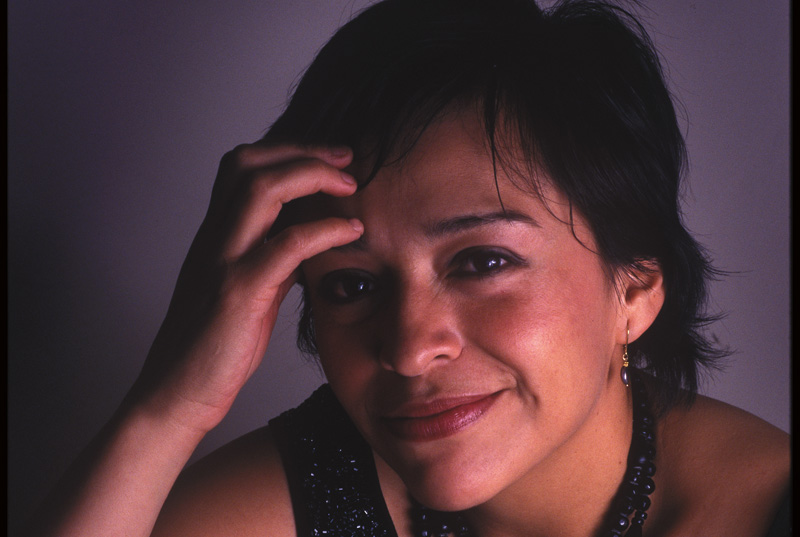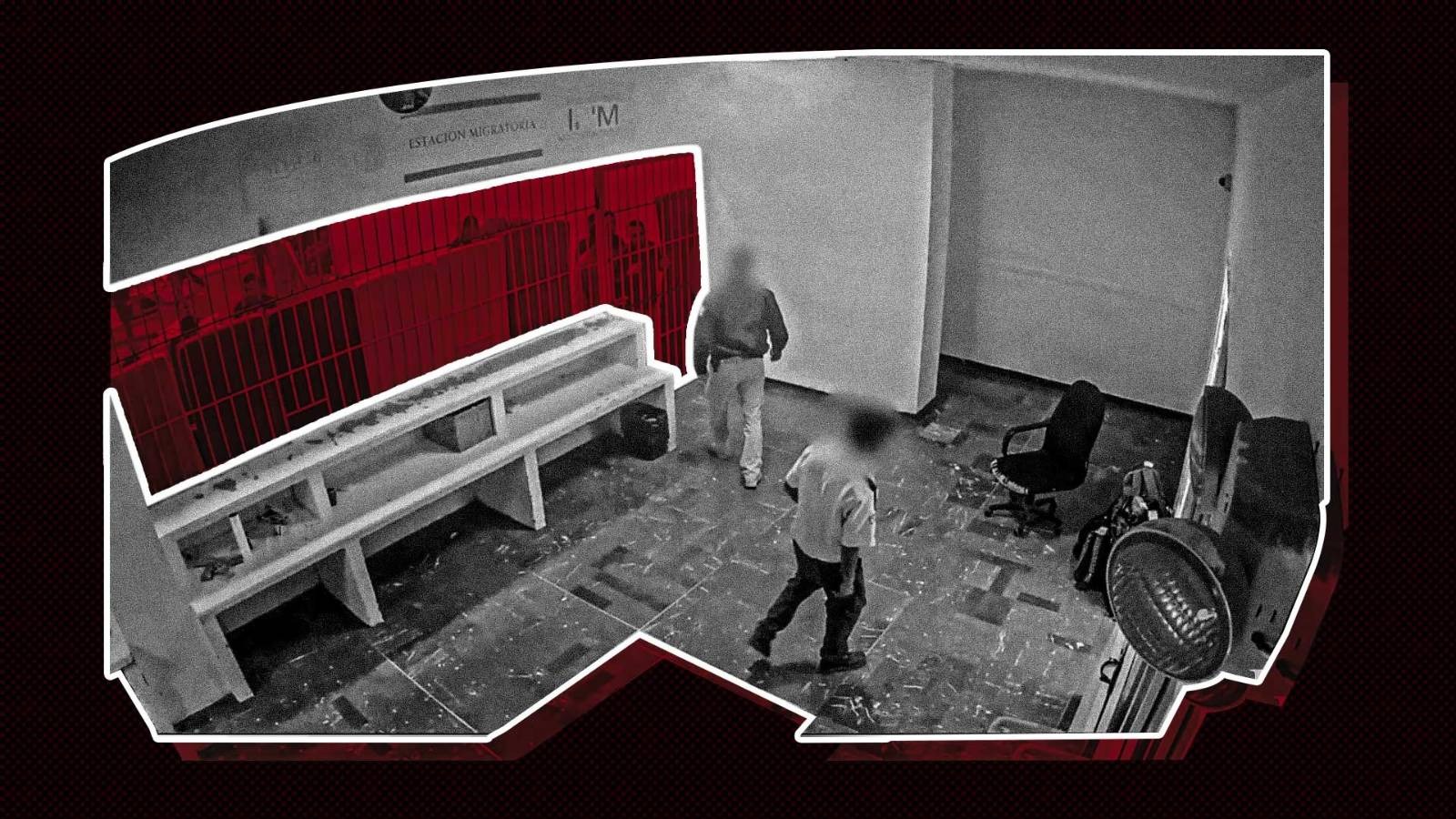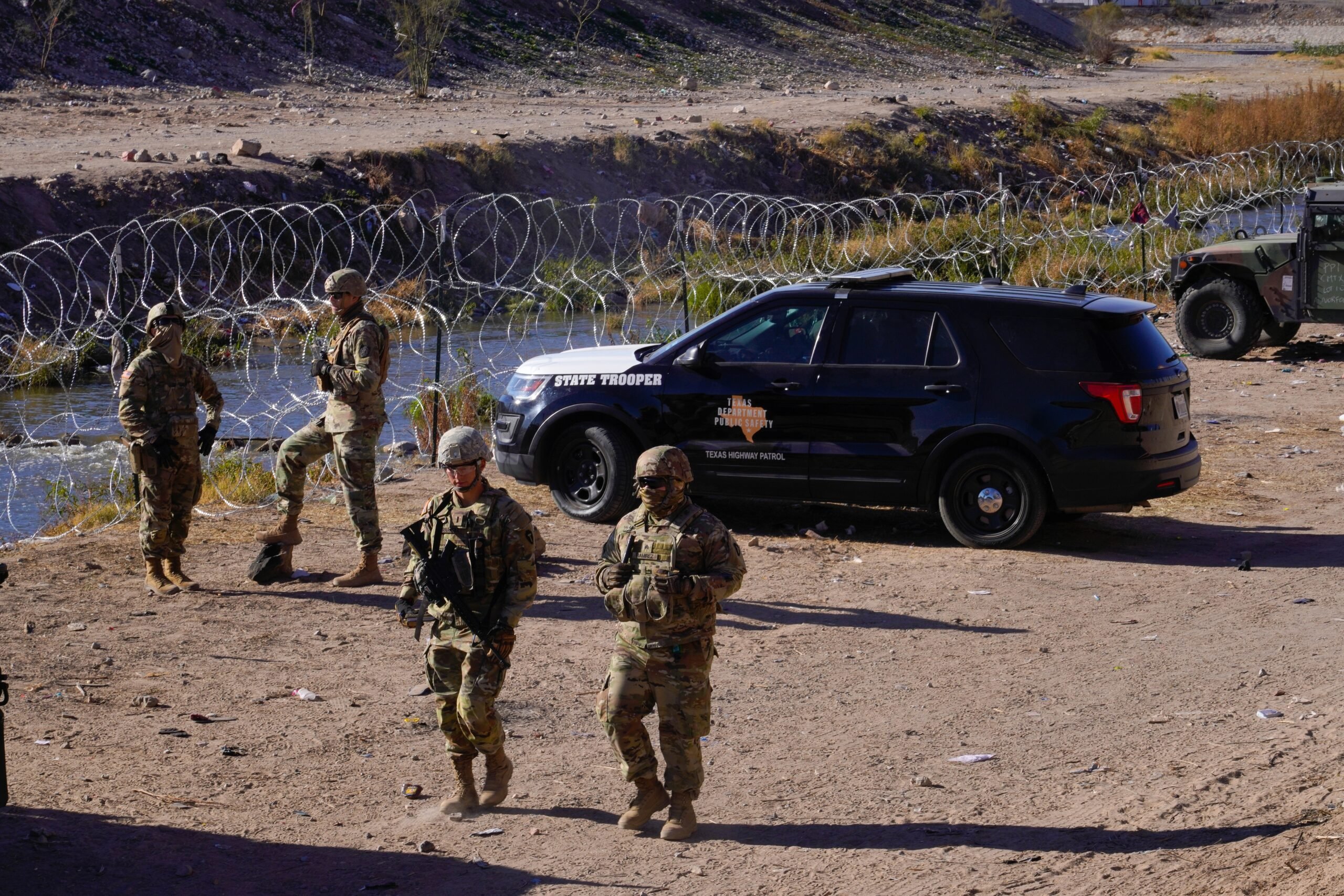
Anabel Hernandez on Mexico’s Lost Drug War and Her New Book Narcoland

Above: Anabel Hernandez
Mexican investigative reporter Anabel Hernandez has spent years combing through government documents and cultivating sources in law enforcement, the military and the drug world. She’s come to the conclusion that Mexico’s drug war can’t be won. Corruption is so deep and systemic within the government institutions charged with fighting narco-trafficking that it’s become a “war for drugs, not against drug trafficking,” she says.
Hernandez’s 2011 bestseller Los Señores del Narco was a sensation in Mexico. It linked former President Felipe Calderon’s powerful head of security forces, Genaro Garcia Luna, with the country’s top drug capos, including Joaquin “El Chapo” Guzman, leader of the Sinaloa Cartel. In 2012, Hernandez was awarded the Golden Pen of Freedom by the World Association of Newspapers and News Publishers for her work in exposing government corruption.
Because of her work, the 42-year old journalist and her family have lived with round-the-clock bodyguards provided by Mexico City’s government since 2010. Now her book has been translated into English and will be released as Narcoland: The Mexican Drug Lords and their Godfathers on September 10 by the UK publishing house Verso. This fall, Hernandez will tour the United Kingdom and the United States to promote her book. I spoke with her recently about Narcoland and her crucial investigative work in Mexico on government corruption and drug trafficking.
Texas Observer: What is the status of your security situation right now? I heard that the Mexican government had announced it would take away your bodyguards.
Anabel Hernandez: Last March the government of Mexico City decided to take away my bodyguards but thanks to the French government and other governments intervening I was allowed to keep them. The worst thing that I am living with now are the death threats. In June, someone left decapitated animals in my house as a warning.
TO: Do you have any idea who might have done this?
AH: I think it’s because I am still investigating and writing about the corruption of Genaro Garcia Luna. He’s not heading the Secretariat of Public Security anymore, he now lives with his family in Miami but all of his key people are still in control in Mexico. [The agency was dissolved in January 2013 by the current president and recreated as the National Commission of Security].
TO: Can you talk more about who Genaro Garcia Luna is and his power within Calderon’s presidency and the role he played in the current security crisis in Mexico.
AH: When Felipe Calderon started his presidency [in 2006], he announced his war on drugs. The head of that war was Genaro Garcia Luna; it wasn’t the army. Garcia Luna lead the government strategy and his institution, the Secretariat of Public Security, received the most money in the war against drugs. This institution got involved with drug traffickers. They didn’t just protect narcos, they helped them traffick drugs in international airports in Mexico City, Tijuana and Cancun for instance. The Federal Police helped the Sinaloa Cartel put drug shipments in airplanes and take them off planes when they arrived. I think it was one of the biggest lies of the Calderon government because he knew what Garcia Luna was up to. Many people told him. The general prosecutor has documents with many testimonies about Garcia Luna and his team’s corruption. But Calderon didn’t want to stop them. I think it’s because he was part of it.
TO: In your book, the soon-to-be-released Narcoland, you spent five years investigating the relationship between drug trafficking and the Mexican government as far back as the 80s. What you describe sounds like a mafia state. Is that what Mexico has become?
AH: I started the book in 2005 after visiting the Golden Triangle [Durango, Sinaloa and Chihuahua]. I went because I wanted to write an article about kids being forced to work in the marijuana and opium poppy fields. But then I discovered that these kids even as young as seven or eight-years-old were proud of their work in the fields because in this region of Mexico at least 90 percent of the families are dedicated to growing marijuana and poppies. These little kids wanted to be part of the family business. It was a shock for me. I went back to Mexico City and wrote the article. Afterward a lawyer contacted me. He was representing a man who worked at the maximum security prison where Chapo Guzman had escaped [in 2001]. He had been thrown in prison because of Chapo’s escape and he wanted to tell his side of the story. So I went to the jail and met with him and what he told me really opened my eyes. He gave me a large file with thousands of documents and I went home and read it. I realized that Chapo Guzman had been one of those little kids in the Golden Triangle helping his father in the marijuana fields. I wanted to know how an almost illiterate child had grown up to be one of the most powerful drug lords in the world and that’s when I started my investigation.
TO: So you followed his trajectory from a small child to the most powerful drug lord in Mexico?
AH: Yes. When he was in prison he had money to pay for women, parties and to bribe the guards because of his cousins the Beltran Leyvas but he wasn’t a powerful person. He had lost all of his smuggling territories and his business. So, it was a big surprise for me to see after his escape from jail and his joining with the Sinaloa Cartel again that he became very powerful in a very short time. I wanted to know why? And I discovered that it was because he had the protection of the federal government.
TO: Was it surprising to you as you learned more about how complicit the government was in the drug business?
AH: It was like swimming in dark waters. I did so many interviews with law enforcement, military officials and so many people involved in the drug world. I spoke with members from each of the cartels and got their stories and cross checked them with documents and other testimonies and that’s how I wrote Narcoland.
TO: And the more you learned the more dangerous it became for you I can imagine.
AH: Yes. Many of my sources were killed and others jailed. I think I stayed alive because I denounced and made public the threats against my life. I made public the death threats from Garcia Luna.
TO: In your book you speak of the abject poverty in the Golden Triangle where families view growing marijuana and poppies as their only means for survival. Has the Mexican government done anything to alleviate this poverty and offer other solutions?
AH: No. I really don’t think that the Mexican government wants to fight against drugs. Because when you go to the Golden Triangle you don’t see the government there. They’re not interested in starting programs to offer the poor people another option, another crop like corn or beans that they can grow. The government isn’t there or offering any alternatives.
TO: Why hasn’t the government done anything?
AH: Because it’s a business and I think illegal drugs globally is a huge business that moves the economies of many countries in many parts of the world. When I talk to the lawyers for instance of some of these large drug capos they explain, ‘Anabel you have to see it like a business’.
TO: Did it surprise you that they talked to you openly about the business?
AH: Well, it wasn’t easy. But I insisted with them that I wanted to understand more about narco-trafficking. “They said, ‘don’t do it. You’re a woman and you have children and it’s not a good idea.’ But I kept insisting and finally they opened the doors. In Mexico, many people think if you want to talk with drug traffickers you have to go to these remote areas where they are hiding out. But most of my interviews are in major cities. Narco-traffickers are not hiding from anybody. They are everywhere and in the best restaurants and staying at the finest hotels.
TO: You also write about the Iran-Contra scandal in your book and the nexus between Mexican drug dealers and the CIA. Can you talk more about that?
AH: There was a very important trial in California of Juan Matta-Ballesteros. Many of the testimonies talked about ties between the CIA and the drug dealers in Mexico such as Rafael Caro Quintero, who as you know was just released from jail in Mexico.
I have an idea that I can’t get out of my head. If the CIA was involved with Mexican drug lords during the Iran-Contra years why wouldn’t it happen again? Who knows? I discovered in 2011 ties between the DEA and Sinaloa Cartel in the trial with Jesus Vicente Zambada Niebla in Chicago. The proof is in the testimonies and files in that case. The DEA is a different agency but it’s a similar scenario where the government gets involved with drug cartels. How many other cases are there out there that we don’t know about?
It’s impossible to think that this very huge elephant— tons of cocaine, tons of marijuana — just walks over the border and goes to Chicago, New York or Los Angeles and nobody sees it. It’s not possible. For instance, there are many houses used in the U.S. to count drug proceeds. Counting that money can take weeks and nobody sees it? It’s not possible. I really think the problems we have in Mexico some of the responsibility lies with the U.S. government and U.S. drug consumers.
TO: Here’s a question that’s often asked. Would legalizing drugs help?
AH: Well, I’m not an expert on that issue. As you know the drug cartels don’t just sell drugs; they have a lot of different types of illegal businesses, like human trafficking. If you make drugs legal there are still the other businesses.
TO: What do you think about the new presidential administration of Enrique Peña Nieto. Can he improve things?
AH: I really don’t know yet, it’s still to soon to say. But what I do know is that all of our institutions are corrupted — the army is penetrated by drug cartels, the federal police and the general prosecutors office. Peña Nieto can’t fight against anything without cleaning them up first. Then you need to make a strategy, but if he doesn’t clean the institutions nothing will work. We don’t have anything to fight with against the drug cartels.
TO: Fighting such deep systemic corruption sounds really difficult. Wasn’t much of this corrupt system allowed to grow under the PRI — the same party that Enrique Peña Nieto belongs to? How do you clean everything, who’s going to do it?
AH: Right. Only people who aren’t corrupt can do it. The problem is that Peña Nieto became president in a controversial election. A few have proved that in his campaign were signs of laundering money. And his presidential election had the least votes in the history of Mexico. So his presidency is very weak. He is part of the PRI, which is the same corrupted party but it has weakened. Its institutions are weak and so is the country.
TO: It used to be that the PRI told drug cartels what to do, but it seems the relationship has changed.
AH: Yes it has reversed. That’s the big difference. The cartels don’t do something because Enrique Peña Nieto wants it. It’s not like it was before in the 70s or 80s.
TO: What do you make of the recent release of Rafael Caro Quintero?
AH: I think it is a really bad sign for Peña Nieto’s presidency. I recently published an article in Proceso where I found documents in court that show Peña Nieto knew one week before Caro’s release that he would be released and his administration didn’t stop it. They didn’t advise the U.S. government either so that they could request his extradition. They kept silent. And when Caro Quintero got out of jail Peña Nieto acted surprised but they knew in advance.
TO: It does seem like the old PRI doesn’t it?
AH: Yes, that’s what I think. It’s a very bad sign for the Peña Nieto presidency and I think it will have consequences. Not only with the U.S. government but also with Mexican society because no one believes that corruption wasn’t involved in his release.
TO: This is off topic but what do you think about the proliferation of self-defense groups in Michoacan and Guerrero. Is it a natural response to the government’s failure to protect people and to the systemic corruption? This to me seems to be a turning point in the drug war. I was curious what you thought about it.
AH: I have been investigating the issue, and I don’t have a conclusion yet but I think I’m close. What is happening in Michoacan and Guerrero is almost the same thing. There have been self-defense groups in these areas for many years, even before the war against drugs. The people vote for these community defense groups, and the groups don’t wear masks because they have nothing to hide. And they use rudimentary, old weapons.
Now, suddenly we have these self-defense groups carrying high caliber weapons and wearing masks that seem to come out of nowhere. I think some of the self-defense groups really are from the communities but others are from the drug cartels. And I have information that other self-defense groups have been put there by the government.
TO: Are the government self-defense groups working in tandem with the drug cartel groups or separate?
AH: That’s what I don’t know yet—if they are the same or separate. It’s very dangerous for Mexico because as you know everything in Colombia got worse when the government let the paramilitaries grow. I think things could get much worse for Mexico and spread beyond Guerrero and Michoacan. I’m very worried about it.
TO: Do you see Mexico as a functioning democracy right now. Do you feel like there is freedom of expression?
AH: No. It’s very sad to say, more because I am a Mexican journalist but in Mexico I can’t say that democracy exists, not if in many parts of Mexico like Jalisco, Michoacan, Veracruz and Tamaulipas the drug cartels are in power. How can democracy exist when they can do whatever they want to? How can we have freedom of expression when so many journalists have been killed? I can’t say that freedom of expression exists when I have to live with round-the-clock bodyguards. Journalists in other countries can walk freely on the streets and I can’t.
TO: Do you know many journalists who have been killed or left the country?
AH: Yes, many. Right now along with Reporteros sin Fronteras we are organizing a program to keep reporters safe because sometimes when they escape places like Veracruz or Tamaulipas and come to Mexico City they don’t know where to go, they have no resources and not even food to eat. So, we are making a program to provide them with some money and food for them and their families because the Mexican government doesn’t really want to do anything.
TO: What do you hope that English-language readers will take from your book?
AH: For me it’s very important that my book is translated because I think that now many people in the world can understand what is really happening in Mexico. Because if they read Narcoland they’ll learn that the biggest problem in Mexico is not the drug cartels—they are just a symptom of the disease—and this disease is corruption. What is happening in Mexico because of corruption can happen in other places, too. If the institutions are weak and the government is involved and if people don’t say anything about it, then they will have another Mexico.
TO: Do you consider leaving Mexico?
AH: Many times I have considered leaving. But I’ve decided to stay. I know very well that I am not the best journalist in Mexico, but I really want to work to help my country. I really believe that good journalism can change things in this world. I want to contribute with my work to change something.


